Pharmaceuticals and Medical Devices
Alginate is listed in the pharmacopoeia and is used as excipient, disintegrant and viscosity agent for pharmaceuticals.
KIMICA established the world's first API plant for an injectable drug substance in 2014. Alginate is used worldwide as a material to save human lives, protect health and relieve pain.
Applications and effects
※Alginic acid and all products derived from it collectively called Alginate. Please refer to the correct product name for each application.
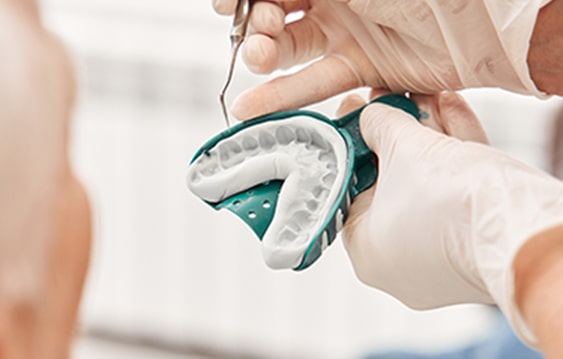
Dental impression
Alginate impression materials are essential for dental treatment.
![]()
![]()

In the field of dental treatment, alginate is used as a base for tooth-moulding preparations (dental impressions), commonly referred to as alginate impression agent.
Dental impressions, a mix of alginate, calcium salts, phosphate and diatomaceous earth, are well established formulations. When mixed with water, the alginate and calcium gelation begins. The reaction time is controlled by phosphate, and gelation is completed in a short time when pressed against the teeth. Alginate impression agents are widely used in dental treatment settings both in Japan and worldwide due to their relatively inexpensive nature, ease of operation (low failure level), ease of use and being able to accurately capture detailed impressions.
- 【Alginate to be used】
- Sodium alginate
- Potassium Alginate
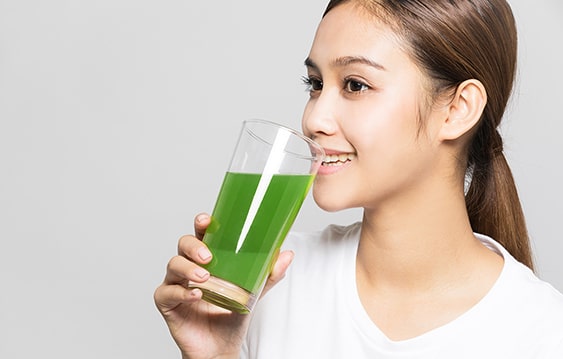
Peptic ulcer agent
Gels in contact with gastric acid to cover the bleeding area and relieve pain.
![]()
![]()

Drugs treating peptic ulcer disease use the properties of alginate which gel under acidic conditions. The ingredient of this oral drug is just an aqueous solution of alginate. When an aqueous alginate solution comes into contact with stomach acid, it becomes insoluble and covers the entire wall of the stomach. If the lining of the stomach is damaged, alginate may react with iron and calcium in the blood to gel over the bleeding area, relieving the attack of stomach acid on the wound and relieving pain. This medicine has been prescribed for many years as a mild oral medication with fewer side effects and less harm to patients.
- 【Alginate to be used】
- Sodium alginate
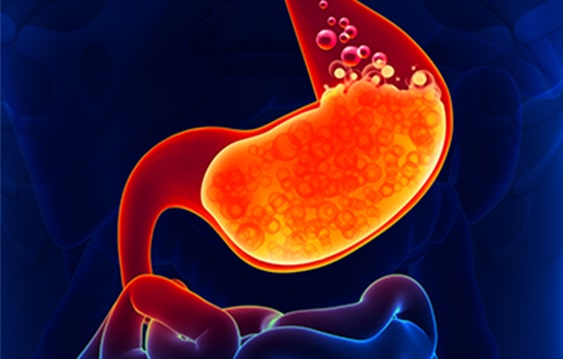
Antacid
This medicine suppresses excessive stomach acid and relieves heartburn and stomach swelling.
![]()
![]()

Drugs that combine an aqueous solution of alginate with an antacid and a raft-forming agent are gaining popularity worldwide. When taken, excess stomach acid is suppressed and insoluble alginate in stomach acid forms a floatable raft that blocks the upper part of the stomach and prevents reflux of the contents. As a result, the symptoms of heartburn and stomach bloating are relieved.
- 【Alginate to be used】
- Sodium alginate, Alginic Acid Salts
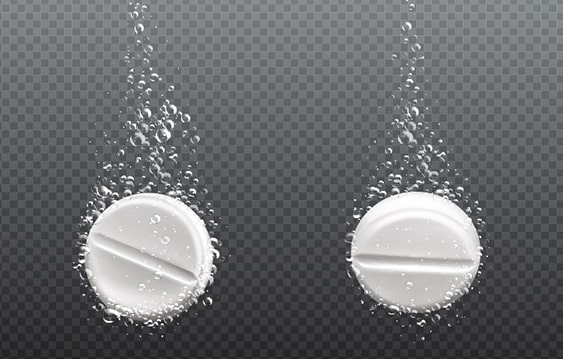
Disintegrant
Controlling the timing of release of drug-effective ingredients from tablets.
![]()
![]()

A hard tablet is moderately disintegrated in the digestive tract and an aid that helps release the active ingredient is called a disintegrant. Powders such as starch are commonly used as disintegrants as they absorb moisture and swell in the stomach after swallowing, thereby disintegrating the tablets (releasing the active ingredients).
Alginate is insoluble under acidic conditions and soluble under alkaline conditions. Therefore, when alginate is incorporated as a disintegrant, alginate in tablets does not swell in the stomach (acidic), but swells when it enters the high pH gastrointestinal tract, causing the tablets to disintegrate (releasing medicinal ingredients). Thus, alginate can be used to control the timing of release of medicinal ingredients.
- 【Alginate to be used】
- Alginic Acid
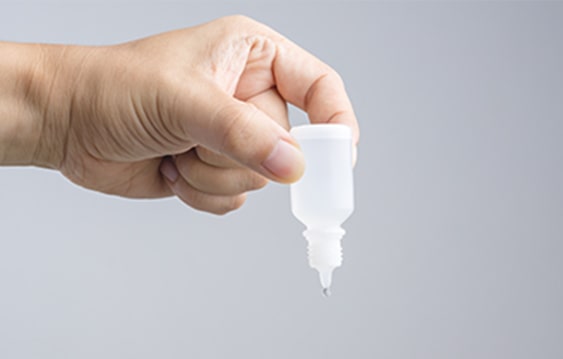
Eye drops
Drug-active ingredients stay on the surface of the eye for longer and act more effectively.
![]()
![]()

Eye drops containing alginate may thicken in response to trace amounts of calcium in tears after application. As a result, it is possible to prolong the time for the active ingredient to reside on the ocular surface. As the retention time of the eye drops increases, the concentration of the eye drops can be lowered, thus reducing irritation caused by the drug. It also reduces the patient's stress by reducing the number of eye drop applications.
If the eye drops themselves are viscous from the start, they are uncomfortable, leaving a sticky feeling over the entire eye. The properties of alginate that make it viscous at the time of instillation are valuable in developing eye drops that are easier to use.
- 【Alginate to be used】
- Alginic Acid
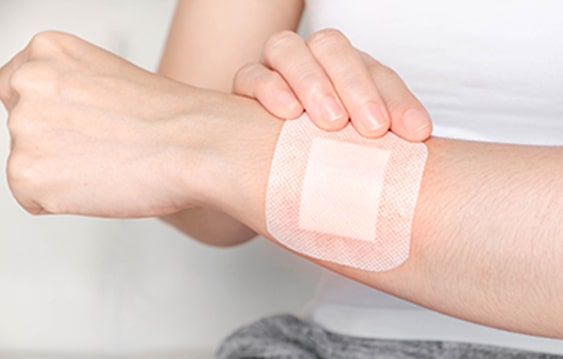
Wound dressing
Wounds (wound surface) remain moist and heal quickly.
![]()
![]()

In the past, experience said that it was better to dry the wound (wound surface) and treat the wound by forming a scab. Recently, however, it has become the mainstream practice to maintain the wet state without drying the wound surface as much as possible.
Wound dressings that maintain the wet condition of the wound surface are made from fibers or sponges of alginate.
Alginate-based wound dressings become swollen and jelly-like on the contact surface from the fluid which exudes from the surface of the wound. This helps maintain a wet condition, makes it less painful when the dressing is removed and it does not damage the wound surface. It is used to treat a wide range of wounds, such as pressure sores.
- 【Alginate to be used】
- Sodium alginate, Alginic Acid Salts

Mucosal protuberant
It has received much attention in the endoscopic treatment of early gastrointestinal cancers.
![]()
![]()

In endoscopic examination and treatment of early-stage gastrointestinal cancer, a local injection (medical device) is injected into the submucosa between the lesion and the muscularis layer. The lesion is lifted (artificially raised) and removed from each mucosa. Low endotoxin alginate is used as the main material for this medical device. Hyaluronic acid has been used in existing products for the same purpose. However, there are concerns about the safety of animal-derived raw materials and the focus is moving to plant-based alginates.
- 【Alginate to be used】
- Alginate for medical use

Regenerative medicine
Attraction as a biomaterial that has no effect on living organisms.
![]()
![]()

In the field of regenerative medicine, research and development is also underway, focusing on the unique properties of alginate. Alginate’s unique physical properties, which change from solution to gel without heating or cooling, enable locally injecting alginate into any location before gelling, or suspending or gelling living tissue in vivo. This property has been applied to scaffolds for tissue regeneration and to substrates for 3D bioprinters.
Other biomaterials used in regenerative medicine often include collagen and hyaluronic acid but animal-derived materials can cause biological reactions when introduced into the body. Alginate from seaweeds, on the other hand, has been shown to have no such reaction and is slowly degraded in the body. "No effect even when administered to living organisms" is a major feature of alginate as a biomaterial.
- 【Alginate to be used】
- Alginate for medical use